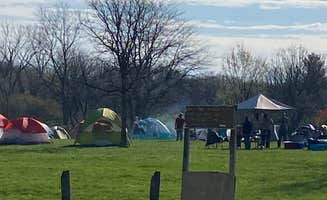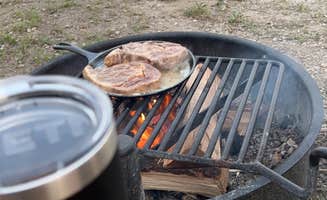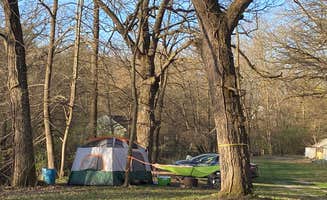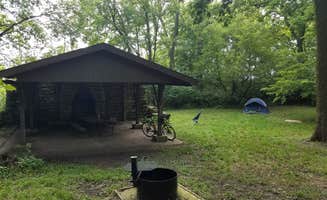Tent camping options near Eureka, Illinois span across the Illinois River Valley region where terrain transitions between oak-hickory forests and river wetlands. The area receives approximately 40 inches of annual rainfall, creating lush environments for campers from April through October. Summer temperatures typically range from 65-90°F with higher humidity levels near water bodies.
What to do
Kayaking opportunities: Kayak Starved Rock Campground offers direct water access on the Illinois River. "If you have your own kayak, while you can avoid paying the rental fee, you will still be charged a $10 launch fee," notes one experienced camper. The campground sits across from Starved Rock State Park, providing paddlers with unique perspectives.
Trail exploration: Hikers can access miles of trails from Buffalo Rock State Park Campground. A visitor explains, "At a leisurely pace, it only took me a couple of hours to walk all the trails. They are nice well-kept trails. Most of the surface is gravel but some parts are just dirt." The trail system connects to the I&M Canal Tow Path for extended hikes.
Wildlife viewing: Watch for deer, waterbirds, and small mammals throughout the area. "Deer run hiking trail is right in camp and gets you a bit of a hike," reports a camper at Spring Lake State Fish and Wildlife Area. Morning and evening hours provide the best wildlife spotting opportunities, particularly around water features.
What campers like
Riverfront views: Many campsites along the Illinois River offer direct water access. At Kayak Starved Rock Campground, "Our campsite was wonderful and was on a point on the river that has a 180 degree view of the river," according to one visitor who appreciated the scenic location.
Quiet seclusion: For campers seeking privacy, some locations provide more isolated options. "If you're looking for privacy this is it," writes a camper about Buffalo Rock's sites. The trade-off often means fewer amenities but more natural surroundings.
Community atmosphere: Certain campgrounds foster strong social connections. At Hickory Hill Campground, visitors appreciate "the very strong Midwestern hospitality and warm welcome you'll receive from just about everyone you encounter here – from the very great folks that run the place to the guests and residents."
What you should know
Primitive facilities: Many tent sites offer basic amenities only. At Hennepin Canal Lock 11, "There are no operable drinking water fountains along the canal so bring your own water for your hike or camping trip." Sites are typically classified as "Class C" with limited facilities.
Seasonal concerns: The camping season generally runs April through October. "We visited in july last year. The sites were right on the water and the price was right," notes a summer visitor to Kayak Starved Rock Campground. During peak summer months, sites with shade become particularly valuable.
Reservation systems: Reservation policies vary widely between locations. At Hennepin Canal Lock areas, camping is "on a first-come, first-serve basis. There are no set check-in or check-out times. The Canal's site security officer makes rounds to each campsite to collect camping fees, in-person."
Tips for camping with families
Playground access: Families with children can enjoy built-in entertainment at select locations. Buffalo Rock State Park Campground features "a playground, restroom(with running water), and drinking fountains with spouts," providing convenient amenities for families with younger children.
Educational opportunities: Starved Rock State Park - Youth Campground offers organized group camping with access to nature programs. "If you are here with your girl/boy scout troop, church group or youth connection team, then you've just discovered a super amazing spot to lay down some tents and get busy with connecting with nature."
Safety considerations: Parents should note varying levels of site security. At Kayak Starved Rock Campground, one family noted, "The Porta potties also have motion sensor lights in them for at night visits." However, another camper at a different location mentioned feeling unsafe as "all the fishermen and hikers go right through your site."
Tips from RVers
Site specifications: RVers need to carefully research campground layouts. At Hickory Hill Campground, "The sites are kind of tight. Gravel sites but mostly level," according to one RVer. Site dimensions and surface composition matter for larger rigs.
Access challenges: Some campgrounds have difficult approach roads. One RVer notes about Hickory Hill, "We called in the afternoon and got a full hook up, pull through spot." However, at other locations like Woodford State Conservation Area, visitors mention "they are waiting for more money from the state to finish improving the entrance road. It was bumpy but not too bad."
Seasonal resident mix: Many campgrounds host both short-term and long-term campers. "This seems to be more of a full time camping location. Lots of buildings and I was offered a lot for sale. Golf carts seem to be the most common mode of travel as there are plentiful," writes a visitor to Hickory Hill, indicating the permanent resident culture found at some locations.





